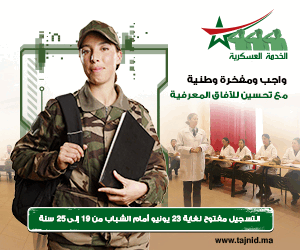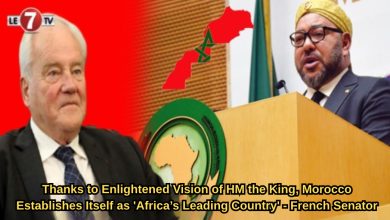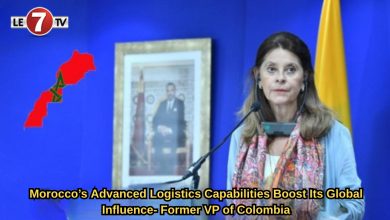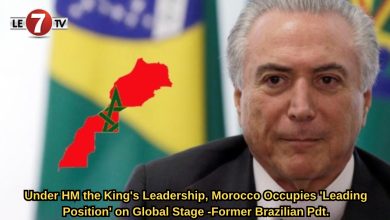HM the King Addresses Message to Participants in 2025 Edition of ‘Ibrahim Governance Weekend’ Forum
Marrakech - His Majesty King Mohammed VI, may God assist Him, addressed a message to the participants in the 2025 edition of the "Ibrahim Governance Weekend" Forum, which opened its proceedings on Sunday in Marrakech.
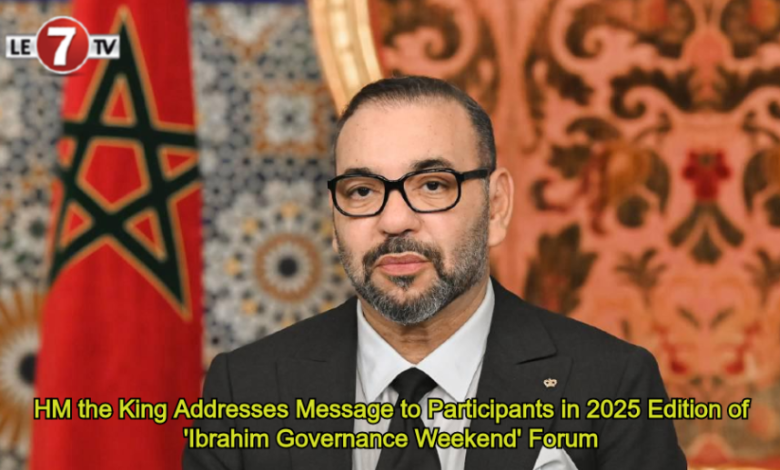
Here is the full text of the Royal Message, which was read by HM the King’s Advisor André Azoulay:
“Praise be to God
May peace and blessings be upon the Prophet, His Kith and Kin
Mr. Mohamed Ibrahim, Founder and Chair of the Foundation,
Ladies and Gentlemen,
It gives me great pleasure to address this message to the 2025 Ibrahim Governance Weekend, which, this year, is being held in Marrakech, under my high patronage. Attending this year’s event are eminent figures from the fields of politics and economics, and from civil society, who have come together to discuss a very important topic, namely financing development in Africa.
This gathering is a precious opportunity to deepen the debate on an ever-relevant issue. It makes it possible to engage collective action to shape the future of a rising African continent, and to live up to the legitimate aspirations of our peoples.
In this regard, I cannot but commend Mr. Mohamed Ibrahim and his Foundation’s tireless efforts. Their endeavors contribute significantly to enriching the debate on African development and promoting the reflection on innovative solutions to address major current and future challenges.
Ladies and Gentlemen,
Our continent is suffering from the knock-on effects of multi-dimensional global crises, which continue to deepen disparities and gaps between countries and regions. This situation undermines the effectiveness of efforts to achieve the Sustainable Development Goals by 2030. It also adversely affects the achievement of our vision for a rich, prosperous Africa.
However, these momentary challenges should, in no way, dampen our common determination to move forward. Our continent should therefore turn these challenges into opportunities for development and growth, unlock its potential, and impose its own vision for the achievement of development. Africa should seek local solutions to its problems, and be the sole master of its destiny.
Needless to say, without adequate financing tailored to Africa’s specific needs, our continent will not be able to implement its reforms, nor carry out its development projects, in an optimal way. Therefore, mobilizing funds is essential to achieve sustainable, inclusive growth. It is also a prerequisite for the valorisation and structural transformation of African economies.
That said, I would like to underscore four key pillars for the achievement of comprehensive, sustainable development in Africa:
First: Changing the model used for development financing: Our continent needs to mobilize greater domestic resources, implement structural reforms to strengthen the macroeconomic framework, promote innovative development financing mechanisms, and effectively leverage remittances from African communities abroad. Indeed, Africa can no longer rely solely on public spending for development, or debt-generating external financing.
Second: Creating an institutional, economic, and social environment conducive to development: To offer investment and entrepreneurship incentives – and therefore create job opportunities – we need to accelerate the reforms relating to good governance in particular, improve the business climate, enhance transparency, protect investors, stamp out corruption, and make the justice system more ethical.
Third: Increasing and stimulating intra-African trade: The economic integration of the African continent is no longer just an option; it has become an absolute necessity in a globalized world, in which Africa’s share of global trade does not exceed 3%. As for intra-African trade, it represents 16% of the continent’s total volume of trade, compared to 60% for Europe, and 50% for Asia.
The launch of the African Continental Free Trade Area can offer good opportunities to boost intra-African trade and serve as a catalyst for growth and sustainable development on the continent. It can contribute to greater industrialization on the continent, enhance the resilience of African economies and help attract investment.
Fourth: Increasing the value of the continent’s abundant natural resources: Since Africa accounts for 40% of the world’s reserves of raw materials, and for 30% of the planet’s strategic minerals, in addition to having significant mineral, energy, water, agricultural, and biological resources, we can no longer allow our continent to be a mere exporter of raw materials.
The time has come for Africa to reap the benefits of its enormous potential, capabilities, and wealth; now is the time to create added value, and generate new revenues in order to finance development. Achieving this goal, however, hinges on the continent’s ability to invest in valorizing its natural resources domestically, set up regional value chains, encourage industrialization, create jobs, and enhance regional and sub-regional integration.
Ladies and Gentlemen,
Morocco has managed to strengthen its role as a strategic catalyst for South-South partnerships, and to serve as a natural bridge between the continent’s various regions and the countries of the South. This has led it to launch concrete, large-scale projects that will lead to a sustainable transformation of the continent’s economic and social landscape.
This is the approach we are applying through major continental projects, such as the African Atlantic Gas Pipeline (AAGP). It is a concrete example of integrated economic development.
In the same vein, and consistent with an approach based on solidarity and the pursuit of shared development, I recently launched the Atlantic Initiative to facilitate Sahel countries’ access to the Atlantic Ocean. The aim is to establish a solid foundation for a new model of regional cooperation. We have also launched the Rabat Atlantic African States Process, which is intended to benefit all parties in the region.
In addition, the experience Morocco has accumulated in several strategic sectors, such as renewable energy, sustainable agriculture, financial services, and transport infrastructure, constitutes an important foundation to build on in order to develop trade relations and promote partnerships at the continental level.
Being fully aware of the paramount importance of financing, Morocco has adopted a strategic approach by putting in place innovative financial mechanisms and ensuring the effective mobilization of domestic resources.
In this regard, the Mohammed VI Investment Fund stands out as a genuine financial stimulus tool that can boost private investment, support small and medium-sized enterprises, promote technological innovation, and stimulate sustainable development. Casablanca Finance City has also succeeded in establishing itself as a major regional financial hub, attracting significant financial flows to our continent.
Ladies and Gentlemen,
Development cannot be decreed; it is achieved through the adoption of ambitious policies, investment in human capital, and sound economic governance.
Therefore, joint efforts must be made at the national, regional, and global levels to bridge the gap in development financing, and contribute to building the emerging Africa we all yearn for.
Nevertheless, and as the deadline for the 2030 Sustainable Development Goals draws near, it is imperative, now – not sometime in the future – to put the issue of financing Africa’s development front and center on the international agenda.
Reducing the high interest rates imposed on African countries in international financial markets, ensuring access to concessional financing and low-interest loans, strengthening the capacity of regional financial institutions to support African economies, improving Africa’s representation within the international financial system, taking into account Africa’s diversity, and reducing fees on remittances from the African communities abroad, are legitimate demands for which appropriate answers and solutions should be found.
In this regard, the Fourth International Conference on Financing for Development, to be held in Seville at the end of this month, is a good opportunity for African countries to keep advocating for urgent solutions to these demands.
Ladies and Gentlemen,
I believe that financing development in Africa requires collective action combining regional and international cooperation efforts. The critical debate on reforming the international financial system should be based on a multilateral approach, in which African countries should be fully involved. Quite often, these countries are marginalized when the rules of the global monetary and financial system are formulated or laid down.
This necessary reform should, above all, ensure that Africa’s legitimate representation in international bodies is enhanced, as this would enable African stakeholders to address the challenges they are facing effectively, and envision potential solutions to them.
In conclusion, I wish to stress that financing development in Africa remains a major challenge which requires innovative, solidarity-based solutions tailored to the continent’s realities.
The Kingdom of Morocco will keep up its resolute action to fulfil its duty and mobilize resources successfully, strengthen strategic partnerships, and promote effective financial mechanisms, in keeping with its constructive vision of South-South cooperation, and in accordance with its unwavering commitment to achieving comprehensive, sustainable development for the benefit of African peoples.
Thank you for your attention. I wish your conference every success.
Wassalamu alaikum warahmatullah wabarakatuh”



